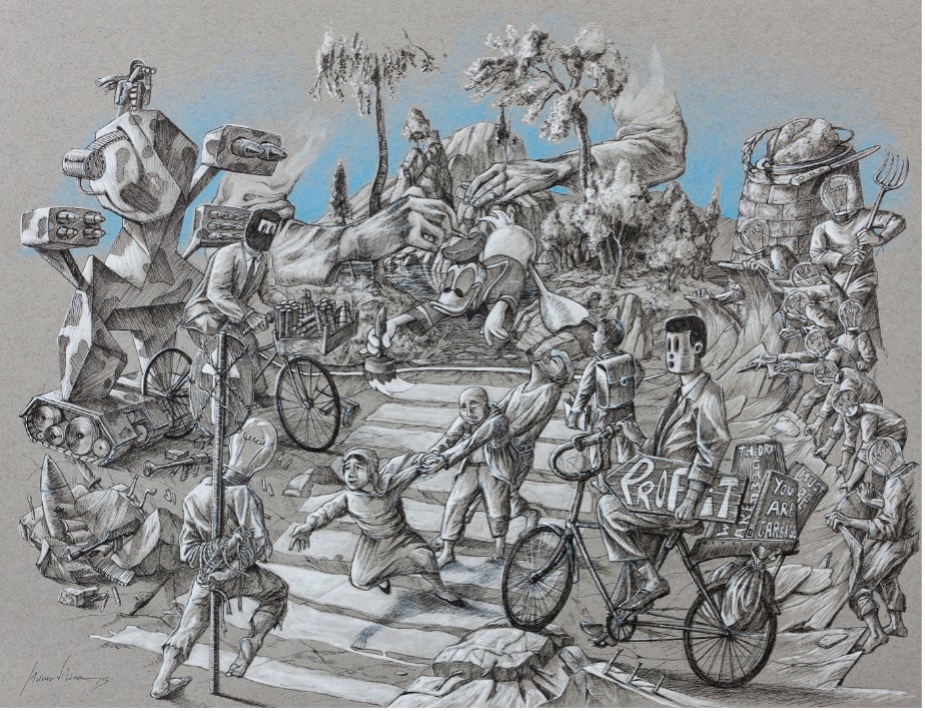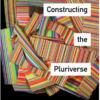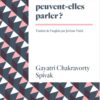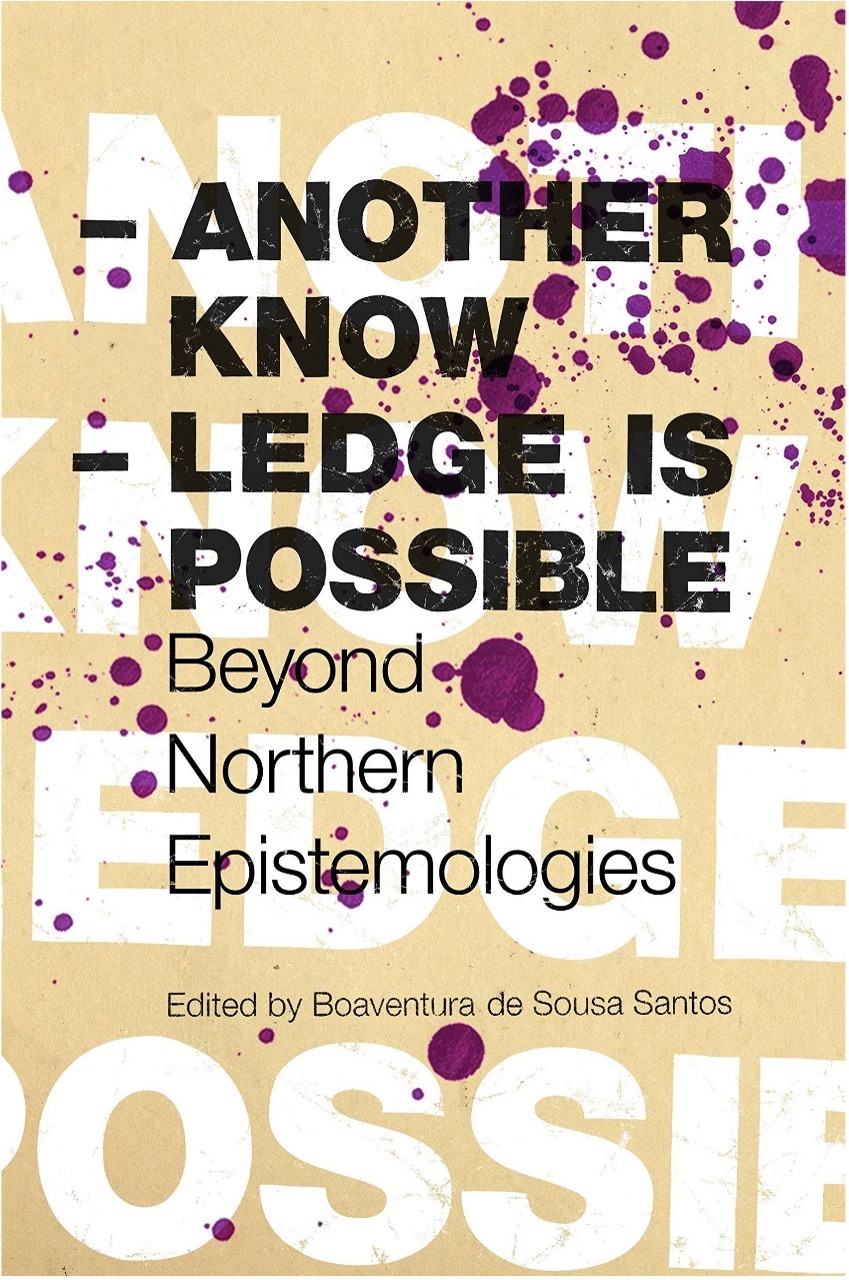This text is licensed under the Creative Commons license Attribution-NonCommercial-ShareAlike 4.0 International. The link to the original material is situated at the top right of the text.

Source: https://epistemologiasdosul.ces.uc.pt/imgs/logo%20-%20Epistemologias%20do%20Sul_c2.png
Project
Keywords: southern epistemologies, ecology of knowledges, intercultural translation
Threads: (Un)framing Knowledge, Inquiring, Cooperating with(in) arts and culture
ALICE Epistemologies of the South Research Programme
Boaventura de Sousa Santos, Bruno Sena Martins, Cristiano Gianolla, João Arriscado Nunes, José Manuel Mendes, Maria Paula Meneses, Sara Araújo, Teresa Cunha (Team of Core Researchers, all based at CES (Center of Social Studies), University of Coimbra)
2017
Keywords: southern epistemologies, ecology of knowledges, intercultural translation
Threads: (Un)framing Knowledge, Inquiring, Cooperating with(in) arts and culture
Short description
The ALICE Epistemologies of the South Research Programme builds upon the ERC-funded research project led by Boaventura de Sousa Santos ALICE: Strange mirrors, unsuspected lessons. Leading Europe towards a new way of sharing experiences from 2011 to 2016. But it goes beyond the classical academic research by cooperating with popular universities in the global south, organizing seminars, winter and summer schools, and by enriching the webpage of the initial project that already contained the ALICE dictionary with more than 200 entries (in Portuguese) on various concepts from “biodiversity” to “Direct Action” or from “Eurocentrism” to “Rationality” and the presentation of publications related to the project, with further resources such as “Teachers of the world”, a collection of biographical sketches of personalities that contributed to “epistemological equality” and “Conversations of the World”, constituted of video talks by Boaventura de Sousa Santos with scholars of the Global South. The webpage also documents the rich oral and written dissemination of the project’s ideas towards a rather large and diverse audience.
Personal appreciation
The sociologist, legal scholar and professor emeritus of the University of Coimbra, Portugal, Boaventura de Sousa Santos, has been researching “Epistemologies of the South” and their benefits for a world struggling to be more sustainable, resilient and socially equal for several decades, in countries of the Global South such as Brazil, Colombia, Mozambique, Angola, Cabo Verde, Bolivia and Ecuador. He never sees his research as purely academic exercise but is highly interested in creating awareness for the Global South and for global equality and justice, in close contact with the actors of social movements such as the World Social Forum, established in 2001 in Porto Alegre, Brazil.
His concept of “knowledge ecologies” that consist of heterogenous knowledges and knowledge formations, is meant to profoundly challenge what he calls “the indolent reason” of Western modernity. It means to accept the coexistence of diverse and sometimes conflicting ways to produce knowledge (and to relate to it). Between different knowledge ecologies a translation – aware of their different epistemological, ontological and methodological foundations - is needed. The research, documentation (and prevention) of forms of “epistemicide”, such as those referred to by Boaventura de Sousa Santos, committed by colonisers of the Americas, seems to me a very important task for the humanities not only in a de-colonial context but also in relation to epistemicides committed during the holocaust, in dictatorial regimes or during war – or simply by ignoring and marginalizing subaltern origins and forms of knowledge (cf. oral, artistic, corporeal, vernacular, tacit knowledges etc.).
His concept of “knowledge ecologies” that consist of heterogenous knowledges and knowledge formations, is meant to profoundly challenge what he calls “the indolent reason” of Western modernity. It means to accept the coexistence of diverse and sometimes conflicting ways to produce knowledge (and to relate to it). Between different knowledge ecologies a translation – aware of their different epistemological, ontological and methodological foundations - is needed. The research, documentation (and prevention) of forms of “epistemicide”, such as those referred to by Boaventura de Sousa Santos, committed by colonisers of the Americas, seems to me a very important task for the humanities not only in a de-colonial context but also in relation to epistemicides committed during the holocaust, in dictatorial regimes or during war – or simply by ignoring and marginalizing subaltern origins and forms of knowledge (cf. oral, artistic, corporeal, vernacular, tacit knowledges etc.).
Contribution to the "Who knows?" handbook
Boaventura de Sousa Santos is one of the outstanding scholars of a decolonial perspective in sociology and epistemology for several decades. Just like the SHAKIN’ project, he and his project team at the ‘Centro de Estudos Sociais’ at the University of Coimbra (Portugal) are not only interested in research but also in new – open and accessible – forms of sharing knowledge and teaching. An exploration of their books, articles and collection of resources on the project website gives most important insights on what we understand by subaltern knowledge and its accessibility. The “ALICE Epistemologies of the South Research Programme” is also a good example of turning sustainable a project that was only financed for some years.
Material(s)
Link to material #1 - (Youtube) Interview of Boaventura de Sousa Santos about the project ALICE, in Portuguese, subtitled in English, 6:32 m
Link to material #2 - Announcement and description of the 2022 International Summer School Epistemologies of the South (6th edition) with this year’s subject “Existing, Resisting, and Fighting through the Arts”, taking place online via zoom from 27 June to 7 July 2022
Link to material #3 - Open access version of the 2007 edited volume Another Knowledge is Possible. Beyond Northern Epistemologies, organised by chapters.
Link to material #2 - Announcement and description of the 2022 International Summer School Epistemologies of the South (6th edition) with this year’s subject “Existing, Resisting, and Fighting through the Arts”, taking place online via zoom from 27 June to 7 July 2022
Link to material #3 - Open access version of the 2007 edited volume Another Knowledge is Possible. Beyond Northern Epistemologies, organised by chapters.
Additional Information
| Location | Coimbra, Portugal Partners e.g.: UPMS Popular University of Social Movements, Porto Alegre, Brazil |
| Original language(s) | Portuguese |
| Existing translations | English, Spanish |
| Length | |
| Project runtime | 2017 - |
| Institution of affiliation | Universidade de Coimbra, Portugal CES – Centro de Estudos Sociais |
| Sponsor(s) | Follow-up to the ERC-funded research project ALICE Now sponsored by various organisms including the University of Coimbra, the FCT (Portuguese Foundation for Science and Technology), The EU-European Fund for Regional Development and the Portuguese Programs PORTUGAL 2020 and COMPETE 2020 |
Name of contributor: Eva Krivanec
Additional Pictures

Original Drawing used for the header of ALICE dictionary. Mário Vitória (2015): Num cruzamento é sempre necessária uma passadeira (At an intersection, a crosswalk is always needed)
Creative Commons
Related Contributions

Book
Bernd Reiter (editor)
Constructing the Pluriverse: Geopolitics of Knowledge
Bernd Reiter (editor)
Zaid Ahmad, Manuela Boatcă, Hans-Jürgen Burchardt, Raewyn Connell, Arturo Escobar, Sandra Harding, Ehsan Kashfi, Venu Mehta, Walter D. Mignolo, Ulrich Oslender, Issiaka Ouattara, Bernd Reiter, Manu Samnotra, Catherine E. Walsh, Aram Ziai
2018
The contributors to Constructing the Pluriverse critique the hegemony of the postcolonial Western tradition and its claims to universality by offering a set of “pluriversal” approaches to understanding the coexisting epistemologies and practices of the different worlds and problems we inhabit and encounter.

Text
Can the Subaltern Speak?
Gayatri Chakravorty Spivak
1988
“Can the subaltern speak? What must the elite do to watch out for the continuing construction of the subaltern?” (p. 294).








